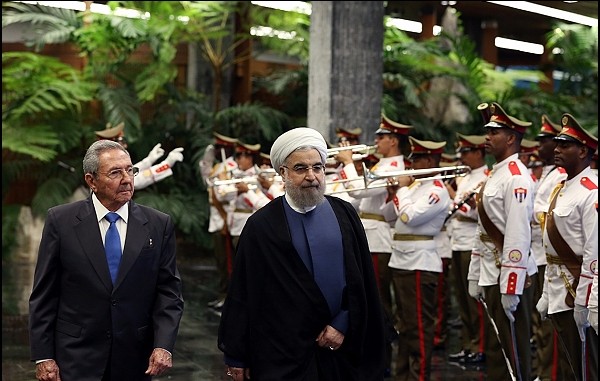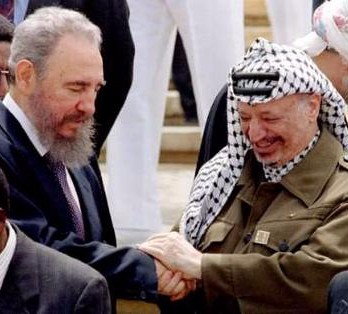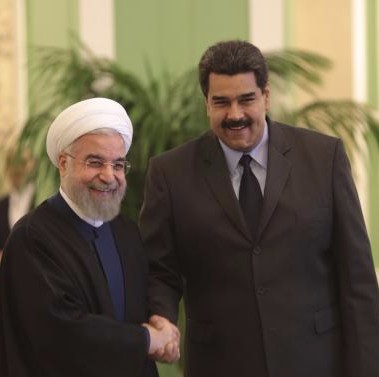
Iran’s Head of State, Hassan Rouhani, with General Raul Castro.
The Israel’s Minister of Culture recent visit to Cuba has generated speculation regarding Cuba-Israeli relations.
The catastrophic destruction of Hurricane Irma on the island’s economic infrastructure combined with the decline of Venezuela’s multimillion subsidy, has generated a desperate need for new aid and investors to mitigate the difficult times ahead. In this fragile environment, Israel is being targeted by Cuba as a potential investor and source of technology.
Cuba’s aggressive historical actions against Israel; support for Iran and its terrorist proxies; and a possible U.S.-Iran confrontation over the nuclear agreement makes the timing of any Israeli concession toward Cuba extremely sensitive.
The Historical Evidence
- Cuba’s support for Palestinian terrorism and its efforts delegitimize the Jewish state through virulent anti-Semitic propaganda goes back to the 1960s.
- Palestinian terrorists were identified in Havana as early as 1966, when Castro introduced the PLO at the Tri-Continental Conference.
- After the Six Days War (1969), Cuba’s ambassador to the U.N. Ricardo Alarcon made a vitriolic speech in which he said that the racist war was an “armed aggression against the Arab peoples…by most treacherous… surprise attack in the Nazi manner.”
- Since the 1970’s, Cuba’s Direccion General de Inteligencia’s agents were dispatched to PLO camps in Lebanon to train and assist Palestinian terrorists.
- In 1973, Cuba broke diplomatic relations with Israel.
- In 1973, Cuba sent troops to support Syria during the Yom Kippur War.
- On March 31, 1974, Israeli Defense Minister Moshe Dayan, said in a U.S. television that 3,000 Cuban troops were sent to support Syria during the Yom Kippur War. In 1978, the Economist published two articles in its Foreign Report which detailed the Cuban presence in Syria as beginning just after the 1973 Arab-Israeli war. Cuban tank crews fought alongside the Syrians. According to the Foreign Report, 180 Cubans died and 250 were wounded.
- In March 1975, at a meeting in Havana of non-aligned states led by Fidel Castro, an anti-Semitic document was approved to expel Israel from the United Nations. It was dropped when the U.S. threatened to leave the assembly and cut financial contributions.
- In 1975, Fidel Castro stated his full support for the PLO by declaring that “Yasser Arafat is a man we deeply love and to whom we have always shown our solidarity.”
- Also in 1975, Communist Cuba supported the United Nation’s Resolution 3379, which labeled Zionism a form of racism.
- In 1976, Cuba’s reaction to Israel’s rescue of hijacked hostages at Entebbe Airport was called a criminal violation of Uganda’s sovereignty.
- In 1976, Raul Castro proudly said that “it is not a secret that in time of danger and threat to the Syrian Republic, our men were with Syria.”
- In 1979, Fidel Castro, at the United Nations General Assembly, accused Israel of committing «the most terrible crime of our era» against the Palestinians.
- On May 9, 2001, four months before the September 11 terrorist attacks in New York, and Washington, Fidel Castro stated in a meeting with Iranian leaders in Tehran, “the American regimen is weak…the people of Cuba and Iran can put the U.S. on their knees.”
- Cuba, Iran and Venezuela have developed strong military and intelligence ties that are at the core of their anti-American alliance.
- In January 2014, there were several street demonstrations in Havana organized by the embassy of Palestine in Cuba with the support of the Castro government commemorating the beginning of Palestinian operations against Israel in 1965 and the establishment of Fatah, the lethal terrorist organization led by Yasser Arafat.
- On August 6, 2014, the Cuban ambassador at the U.N. General Assembly repeated Fidel Castro’s harsh criticism against Israel: “why does (Israel) believe that the world will be insensitive to the macabre genocide which today is being perpetrated against the Palestinian people?” Castro also described Israel’s Gaza offensive as a «Palestinian Holocaust.»
These are a few of the anti-Israeli policies of the Castro brothers.
In response to the attacks against U.S. diplomats in Havana, Cuba is viewed in Washington as a criminal regime closely allied to Iran, Venezuela and Syria.
Israeli officials should think twice before normalizing relations with Cuba and providing aid to a military dictatorship that violates the human rights of its people and is an avowed enemy of the U.S. and Israel.
The Israeli administration should consider the implications for its relationship with Washington of normalizing relations with Cuba. U.S. support for Israel might suffer irreparable damage at a time when the U.S. is punishing Cuba for its attacks on U.S. diplomats, for its continuous support for Iran and Hezbollah and for its alliance with the Venezuelan narco-dictatorship.

Fidel Castro and Yasser Arafat.

Hassan Rouhani with Nicolas Maduro.









